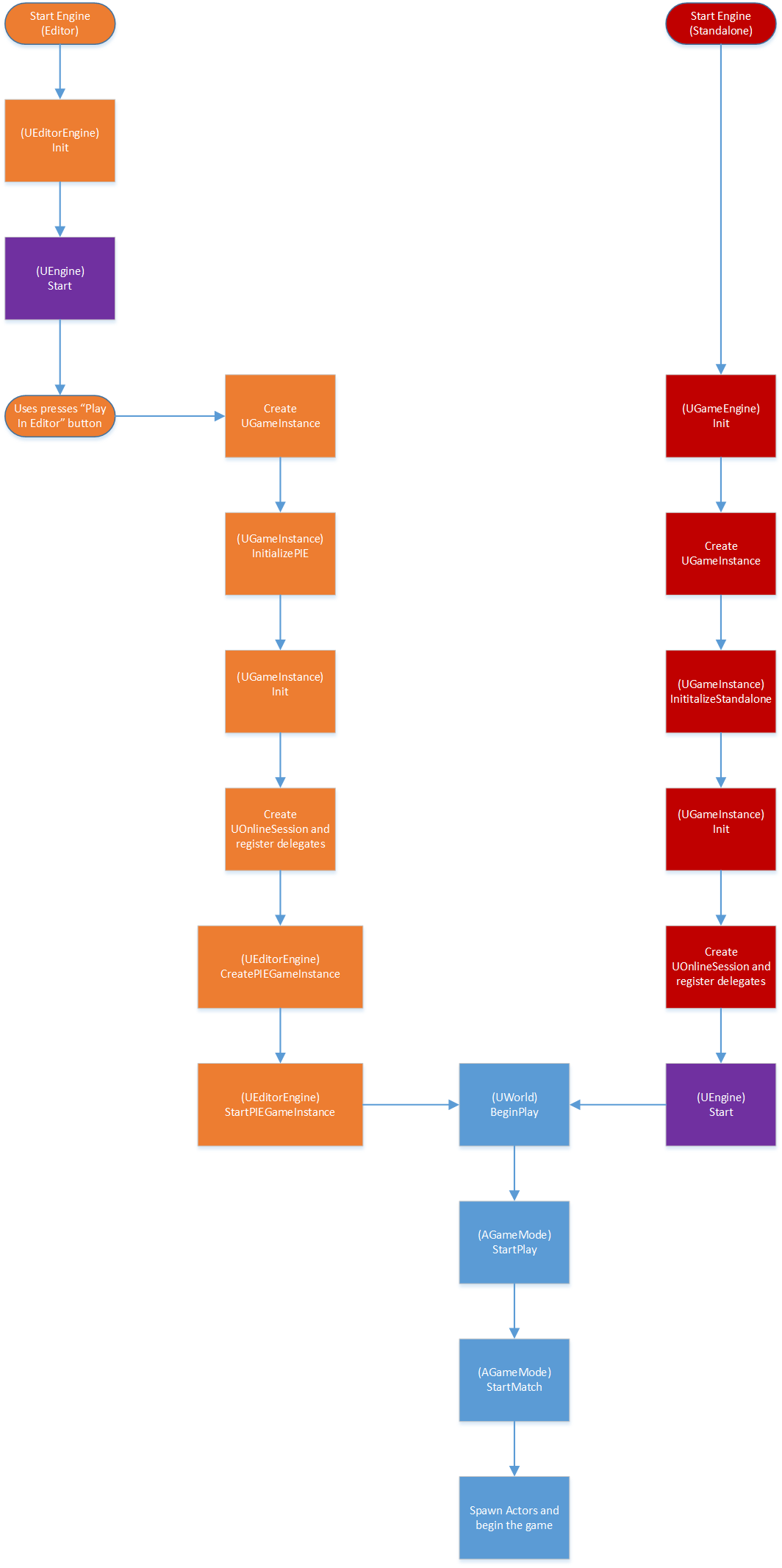Game Flow Diagram#

Related: Detailed Actor LifeCycle Diagram
Details#
Numbers signify steps not necessarily at the same class nesting
-
UGameEngine::Init
-
UGameInstance::InitializeStandalone()
- UGameInstance::Init() - CreateUOnlineSession and Register Delegates()
-
UGameEngine::Start
-
UGameInstance::StartGameInstance()=>
- UEngine::LoadMap()
-
UWorld::InitializeActorsForPlay() - Call register components on all actor components in all levels. Note: Construction scripts are rerun in uncooked mode
- UActorComponent::RegisterComponent() - Adding itself to its owner and inside owner's world, possibly creating rendering/physics state
-
ABBGameModeBase::InitGame - Create the Game Session and register FGameDelegates (ex: PreCommitMapChangeDelegate, HandleDisconnectDelegate)
-
Ulevel::RouteActorInitialize() -
-
a) Actor::PreInitializeComponents() - On all actors in the level
-
Side Note: AGameModeBase::PreInitializeComponents() creates
-
AGameStateBase and calls InitGameState()
-
AGameNetworkManager which handles game-specific networking management (cheat detection, bandwidth management, etc)
-
-
b) Iterate through Ulevel::Actors[] and call these functions on them one at a time
-
Actor::InitializeComponents()
-
UActorComponent::Activate() - Sets Component Tick To Be Enables & bIsActive = true
-
UActorComponent::InitializeComponent() - Place for components to Initialize themselves before BeginPlay (Actor or Component for anything in the world)
-
-
PostInitializeComponents() - Code that can run after gaurantee that all components have been initialized
-
c) Iterate through all Ulevel::ActorsToBeginPlay[] and call BeginPlay() to allows code to run with assumption that all other level actors have been PostInitializeComponents()
-
Not sure why this is here instead of the main call to BeginPlay(possibly for networked late joins?)
-
-
FWorldDelegates::OnWorldInitializedActors.Broadcast(OnActorInitParams)
- Uworld::BeginPlay()
-
a) GameMode::StartPlay()
-
GameMode::StartMatch()
-
GameState::HandleBeginPlay()
-
AWorldSettings::NotifyBeginPlay()
-
Actor::BeginPlay(), for all actors
- UActorComponent::RegisterAllComponentTickFunctions() - Allows components to register multiple tick functions (ex: Physics tick, cloth tick in skeletalmeshcomponent)
- UActorComponent::BeginPlay()
-
-
FEngineLoop::Tick()
-
UGameEngine::Tick()
-
Uworld::Tick()
-
FTiskTaskManagerInterface::StartFrame()
-
Queues up all the TickFunctions according to their dependency graph & TickGroup
-
Ticking within each group is done by a dependency graph (AddTickPrerequisite) of tick functions of various objects during TickFunction registration
-
This function might change what TickGroup something runs in according to the prerequisite tick function's tickgroup
-
Actor Components do not necessarily tick after their owner Actor
-
Calls RunTickGroup() for various tick groups which ticks components
-
FTickableGameObject::TickObjects() - ticks UObjects or anything that derives from FTickableGameObject (e.g. SceneCapturerCubes or LevelSequencePlayers )
-
-
FTicker::GetCoreTicker().Tick(FApp::GetDeltaTime()) - Ticks all objects of type FTickerObjectBase. Ex: FHttpManager, FAvfMediaPlayer, FVoiceCapture, FSteamSocketSubsystem)
-
This would be great place to add Objects that need to tick at the end of the frame that are engine/world agnostic
-
Good possible place for our own UDP network ticking replication
GameMode Flow:
- InitGame()
- InitGameState()
- PostInitializeComponents()
- ChoosePlayerStart_Implementation()
- PostLogin()
- HandleStartingNewPlayer_Implementation()
- ChoosePlayerStart_Implementation()
- SetPlayerDefaults()
- RestartPlayerAtPlayerStart()
- StartPlay()